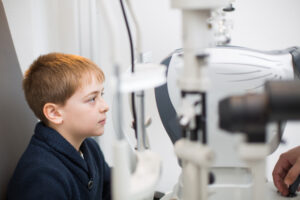What is the difference between an optometrist and an ophthalmologist?
Did you know that not every eye care professional is the same?
Qualifications and areas of specialization are specific to each different profession. It is beneficial to have a working knowledge of the various subspecialties that exist within the field of ophthalmology before you need the services of an eye care specialist in order to address any issues with your health.
Continue reading to learn more about the differences between each eye care professional!
Ophthalmologist
An ophthalmologist is a highly qualified medical doctor who has chosen to focus on the treatment of eye diseases and surgical options. However, the vast majority specialize in the medical and surgical care of the eye and its surrounding structures.
Duties of an Ophthalmologist
- Eye Surgeries related to advanced diseases such as glaucoma, cataract, strabismus and trauma-induced injuries
- LASIK and other refractive surgeries
- Treating advanced-stages of eye conditions such as glaucoma, iritis, macular degeneration, and cataracts
Optometrist
Your initial eye care requirements can be fulfilled by your local optometrist. If you need glasses or contact lenses, the odds are good that you’ve seen an optometrist at least once.
When you see the eye doctor, it will be an optometrist who examines your eyes and evaluates your eyesight. In addition, they are trained and able to write prescriptions for eyewear including eyeglasses and contact lenses.
Optometrists are required to complete four years of post-graduate education at a School of Optometry, after obtaining a Bachelor of Science at a university.
Duties of an Optometrist
- Comprehensive eye exams
- Prescription eyeglasses, eye drops, reading glasses, and contact lenses
- Diabetes-related eye problems must be monitored.
- Managing eye diseases such as glaucoma, iritis, stye, dry eye, and cataracts and more
- Emergency eye care
- Prescribe oral and topical medications
- Specialty services such as vision therapy and myopia control
Optician
An optician is one of the three O’s that make up the eyecare field. An optician is a specialist who has a field of knowledge and expertise that includes adjusting eyeglasses and selecting the most appropriate types of lenses, sunglasses, frames, optical aids, and simple magnifying devices for presbyopia. In addition, an optometrist may also be responsible for diagnosing and treating eye diseases and conditions.
Because opticians lack the medical training required to practice as eye doctors, they are unable to provide eye exams, diagnose medical eye conditions such as dry eye, or write prescriptions for contact lenses.
In Conclusion:
Optometrists and Ophthalmologists treat eye and vision issues. An ophthalmologist can-do surgery and other difficult eye treatments, while an optometrist performs non-surgical eye care services. Visit our clinic here at Lumos Vision Care to meet our optometrist!








